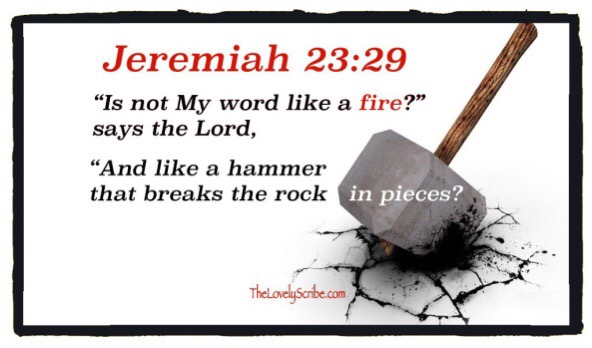THE SEED
“Is not my word like a fire? saith the LORD; and like a hammer that breaketh the rock in pieces?” Jeremiah 23:29
The potency of God’s Word is the power and force of His Word that makes it possible to do whatever it says or demands. The Lord himself says that His Word is like a fire and like a hammer! The word became flesh through Jesus, going out of His way to redeem sinners, lifting the fallen, encouraging the despised, and giving hope to everyone who believes. The potency of God’s Word is its ability to become what is pronounced. The Word is like fire to purify our life like gold and to burn into ashes diseases, illnesses, and sin. The Word is like a hammer to smash a stony heart and demobilize all our enemies. The potency of the word of God is for cleansing. The Bible says how can a young man keep his way pure, by guiding it according to the word of God. The word of God can also be stored in our hearts, to be memorised and meditated upon so that we might not sin against God. Dearly beloved, you can depend on God’s Word any day, anywhere and in any circumstances, especially in this time of economic challenges. This truth puts us at ease as we journey through life because we know that the Word of God cannot fail. The Word of God is truly powerful to meet our everyday needs.
BIBLE READINGS: Psalm 119: 9-11
PRAYER: Father Lord, let the potency of your words fill me for constant meditation.
ÀGBÀRÁ Ọ̀RỌ̀ RẸ̀
IRUGBIN NAA
“Ọ̀rọ̀ mi kò ha dàbí iná?lí OLÚWA wi: àti bí òòlù ìrìn tì n fọ àpáta túútú” Jeremáyà 23:29.
Agbára Ọ̀rọ̀ Ọlọ́run jẹ́, agbára àti ipá ọ̀rọ̀ Rẹ̀ tó mú kí ohunkóhun tó bá sọ, ṣeé ṣe, tàbí ohun tó ba béèrè fún. Olúwa fúnra rẹ̀ sọ pé ọ̀rọ̀ Òun dà bí iná, ó sì dà bí òòlù! Ọ̀rọ̀ naa di ẹran ara nipasẹ Jesu, ti o lọ kuro ni ọna rẹ, lati ra awọn ẹlẹṣẹ padà, láti gbe awọn ti o ṣubu ró, iyanju fun awọn ti a kẹgàn, ìrètí fún gbogbo eniyan ti o gbagbọ. Agbára ti o wà nínú ọ̀rọ̀ Ọlọrun ni lati jẹ ohun ti O sọ, eyi ti o tumọ si ohunkohun ti Ọlọ́run ba sọ le di ohun ti a pe ni ọrọ náà. Ọ̀rọ̀ Ọlọ́run dabi ina lati sọ aye wa di mimọ, bi wura ati sisun aisan, àìlera ati ẹṣẹ di eérú. Ọ̀rọ̀ náà dabí òòlù lati fọ ọkan okuta ati lati mu awọn ọta wa wà ni aibalẹ ọkàn. Agbára ti ọ̀rọ̀ Ọlọ́run wà fun ìwẹ̀nùmọ́, Bibeli sọ pé bawo ni ọdọmọkunrin ṣe le pa ọna rẹ mọ nipa didari rẹ gẹgẹ bi ọrọ Ọlọrun. Ọlọrun tun le wa ni ipamọ sinu ọkan wa, lati fi ṣe akọsori àti ní ṣíṣe àṣàrò lori rẹ ki a ma bàa ṣẹ si Ọlọrun. Olufẹ ọwọn, gẹgẹbi onigbagbọ, o le gbẹkẹle ọrọ Ọlọrun ni ọjọ kojọ, nibikibi ati ni awọn ìgbà ti o nira, tabi nígbàtí ilakoja ba mọ́ níwọ̀n, paapaa li akoko yi, ti awọn ipenija ọrọ-aje ti n ba aye já ìjàkadì. Òtítọ́ yii fi wa lọ́kàn balẹ̀ bi a ti n rin irin ajo laye, nitori a mọ̀ wipe ọ̀rọ̀ Ọlọ́run ko le kuna. Ọ̀rọ̀ Ọlọ́run lágbára lati bá àwọn àìní wa pàdé.
BIBELI KIKA: Iwe Orin Dafidi 119: 9-11
ADURA: Baba, Olùwà jẹ́kí agbára ọrọ rẹ kún mi fun iṣaro nigbagbogbo.
